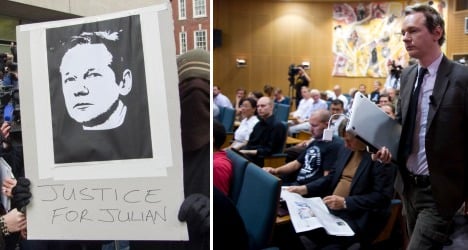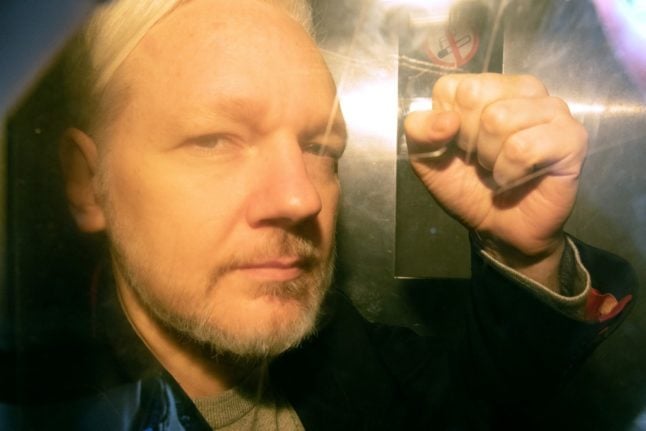Following his release Thursday after nine days in a London prison since his arrest on a Swedish warrant on December 7th, Assange told the BBC the allegations against him were “a very successful smear campaign and a very wrong one.”
The two Swedish women who accuse Julian Assange of rape, sexual molestation and coercion are a 31-year-old feminist activist and a 27-year-old admirer, various corroborative sources say.
Since the allegations the two have kept out of the spotlight, with one moving to the Palestinian territories on a Christian mission and the other cutting her phone line.
AFP is not revealing their full identities, which were kept secret by Swedish prosecutors.
Both Miss A and Miss W, as they were called in a British court hearing on Stockholm’s still pending demand for Assange to be extradited to Sweden for questioning about the allegations, are connected to him by an event on August 14.
That day, the 39-year-old Australian gave a seminar in Stockholm organised by the Social Democratic Party’s Christian wing and titled “The First Casualty of War is Truth”.
Miss A, 31, was working for the organisation and acted as an unofficial go-between for Assange and journalists during his visit.
She also allowed him to stay with her from his arrival in Stockholm on August 11, according to a transcript of the women’s account to police obtained by AFP.
Miss A and Assange had sex several times at her one-room Stockholm flat, according to Swedish tabloids, giving details that were blocked out of the police transcript.
Representatives of Swedish prosecutors told the British hearing that “unlawful coercion” occurred on August 14 because Assange held down Miss A in a sexual manner.
Another encounter on August 18 was characterised as “sexual molestation”, because Assange had sex with Miss A without a condom despite her “express wish” one should be used, they said.
Assange also “deliberately molested” Miss A on the same night “in a way designated to violate her sexual integrity”, the British court heard.
Nonetheless, the WikiLeaks head stayed at Miss A’s flat until August 20, even accompanying her to a party on August 15.
On her still active blog, the 31-year-old describes herself as “a political scientist, communicator, entrepreneur and freelance writer with special knowledge in faith and politics, equality matters, feminism and Latin America”.
A Master’s thesis on Cuba, her admiration for former Argentinian president Nestor Kirchner and a now-removed blog post on how to get revenge on an ex-boyfriend have led to a slew of cyberspace rumours about her motives for accusing Pentagon nemesis Assange.
“CIA agent, angry feminist/Muslim-lover, Christian fundamentalist, lesbian and desperately in love with a man, can one be all that at the same time?” she commented on her Twitter account earlier this month.
Miss W., 27, was also in the audience at Assange’s talk on August 14, sitting in a bright pink jumper on the front row with a number of journalists.
Her background and occupation are not as well know as her co-accuser’s, but her admiration for Assange and her encounters with him are described in detail in the police interview transcript.
She saw him on television discussing the release in July of classified US documents on the Afghanistan war, and told police she found him “interesting, courageous and admirable”.
When she found out the WikiLeaks head was speaking in Stockholm on August 14, she went to the event, insisted on spending the evening with Assange and friends after the talk, and ended up alone with him at the cinema.
There they flirted and he said he found her “very attractive,” she told police.
Two days later, they travelled to Miss W’s home in Enköping, some 50 kilometers northwest of Stockholm.
But Assange “spent the train ride looking at Twitter posts about himself” and by the time they arrived at her place, “the passion and excitement were gone”, she told investigators.
The rape allegations stem from later that night at Miss W’s home: the British court heard that Assange had sex with her without a condom while she was asleep.
The following morning, they had breakfast together, and “in an attempt to de-dramatise what happened”, she made “sarcastic comments”.
She then took him back to the train station and he promised to call her.
Defence lawyer Claes Borgström said the two women later discovered they had both had similar experiences with Assange and went to the police on August 20.
“They were not sure they wanted to (press charges), they wanted to get advice” and were also worried they could have contracted HIV, Borgström told reporters earlier this month.
“When they told the police officer, a woman, she realised that what (the women) were telling her about was a crime. She reported that to the public prosecutor who decided to arrest Assange,” the lawyer said.
The following day, the story made the front page of tabloid Expressen, launching the scandal and its numerous ramifications.
Assange has not been charged and says his lawyers have been given no evidence to back up the Swedish assertions, which prosecutors insist have nothing to do with the activities of WikiLeaks.



 Please whitelist us to continue reading.
Please whitelist us to continue reading.
Member comments